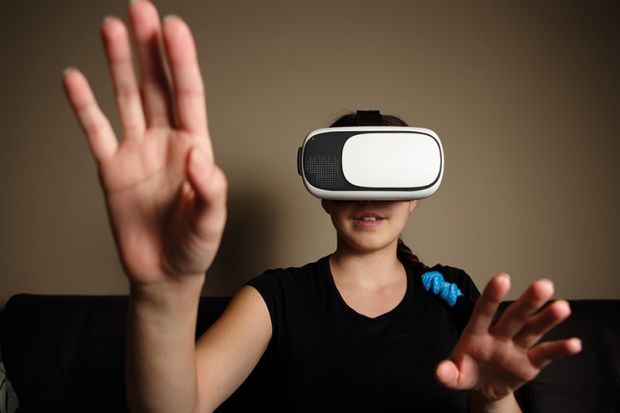Academics, watch out: you may soon be engulfed by a new wave of predictions that the days of the physical university are numbered. A few years ago, just about every interested publication in print, including this one, ran an article that asked a question along the lines of: “will Moocs replace the university?”
In 2017, unless we’ve learned lessons from the Moocs hype cycle, expect to read plenty of headlines that ask: “will virtual reality replace universities?” As we detail in a feature this week, advocates of virtual reality are claiming that after donning a headset, students will feel like they really are in a lecture hall speaking with their lecturers and classmates. It could make online learning as engaging and immersive as a campus, they claim, solving the problems that dogged massive open online courses.
The trouble with this kind of techno-optimism about new ways to deliver teaching – be it through Moocs or VR – is that it rests on the quaint idea that the main point of going to university is to acquire knowledge. If this was the case then universities would have died out shortly after the emergence of the printed book more than 500 years ago.
Students will still want to go to campus universities even if they could acquire the very same subject knowledge from an online VR course. The student social experience, which is hardly going to be replaced by VR, not least because we are a very long way from simulating virtual intoxication, is an obvious reason.
Another less obvious advantage of the campus university is known in the economics of education as signalling: you win a place at university simply to prove to future employers that you are clever enough to do so. How much of the graduate premium is down to signalling, rather than genuine knowledge and skills gained at university, is very difficult to measure, but economists think it is sizeable. As long as it is harder to get in to Harvard as an undergraduate than to enrol in a Harvard VR Mooc, it will be worth going to the real Harvard in order to have an edge in job interviews a few years down the line.
And as the political shocks of Trump and Brexit should make clear, universities also appear to be imparting something that gives graduates a different political worldview from others: in both ballots, education levels were the single most important variable in explaining how people voted.
In other words, graduates seem to come out of university more at ease with the modern world. Whether you think that’s a good thing or not, it will remain attractive to young people, but it’s unclear to me whether VR learning would have the same mellowing effect (for full disclosure, there is an argument that the causation runs the other way: that more open people want to go to university, not that universities make people more open).
To be clear, I’m certainly not sceptical about VR’s potential to improve teaching in existing universities. As proof, just watch this video of medical students exploring 3D models of the brain, taught by a professor beamed in from another city. I would be surprised if medical schools that can afford it aren’t doing the majority of their teaching in VR (or augmented reality, where you can see your surroundings at the same time) in 10 years' time.
One final thought: VR could be a fantastic tool for lecturers in areas like anatomy, chemistry and engineering where students need to know how things work in a 3D space.
But in the humanities, or indeed any subject where students spend most of their time reading and thinking about texts, how exactly does it help? This raises the prospect of a VR divide in universities, where natural science students get to learn with the aid of this extraordinary new technology, but those doing English and history have to remain where they have been for hundreds of years – in the library with a book.
Register to continue
Why register?
- Registration is free and only takes a moment
- Once registered, you can read 3 articles a month
- Sign up for our newsletter
Subscribe
Or subscribe for unlimited access to:
- Unlimited access to news, views, insights & reviews
- Digital editions
- Digital access to THE’s university and college rankings analysis
Already registered or a current subscriber?






